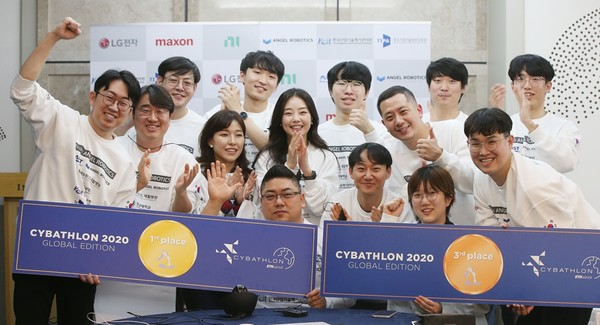The Cybathlon 2020 Global Edition, an international competition for innovative assistive technology for handicapped people, was held for Korean teams at KAIST on November 13. The teams from KAIST, Angel Robotics 1 and 2, placed first and third respectively in the exoskeleton (EXO) division.

The competition was divided into six different disciplines, and 60 teams from 25 countries tested their latest assistive technologies over two days. After the first competition was hosted in 2016, the second Cybathlon was to be hosted in Switzerland. However, due to the ongoing pandemic, the Cybathlon was instead held separately in each participating country by rebuilding competition sets locally. Judges traveled from Switzerland to the competition locations in all 25 nations to ensure fair environments and scoring.
This year two KAIST teams participated in the powered exoskeleton race (EXO). The race consisted of fairly challenging activities such as stacking cups, walking up steep slopes, navigating through rough terrain, amongst others. The team that could complete the highest number of tasks in the least amount of time was declared the winner of the division. The Angel Robotics teams 1 and 2, both from a robotics startup company led by Professor Kyoungchul Kong from the Department of Mechanical Engineering, competed against twelve other teams and placed first and third. The triplegic pilots from the two teams completed the race in Angel Robotics’ improved WalkOn Suit 4, which allowed the pilots to easily balance without a cane and walk around eight times faster than the previous suit. Weighing just 35 kilograms, the WalkOn Suit 4 aims to replace wheelchairs and give greater mobility to the handicapped.
The EXO race division is one of the most challenging races in the Cybathlon, as the pilots rely completely on the machines for their balance, and minor errors in the exoskeleton suits could lead to serious injuries. However, successfully pushing the technological boundaries to outperform other teams in the EXO division will help Angel Robotics to gain attention as one of the leading exoskeleton teams in the world.
The teams worked with various researchers from Severance Rehabilitation Hospital, Korea Labor Welfare Corporation Rehabilitation Engineering Research Center, and Yeungnam University to continuously enhance their suits.
Furthermore, Angel Robotics seeks to create Angel Suits for clinical mobility rehabilitation. With the experience gathered from making the cutting-edge WalkOn Suit, the company hopes to create innovative machines that will aid people with mobility difficulties.

